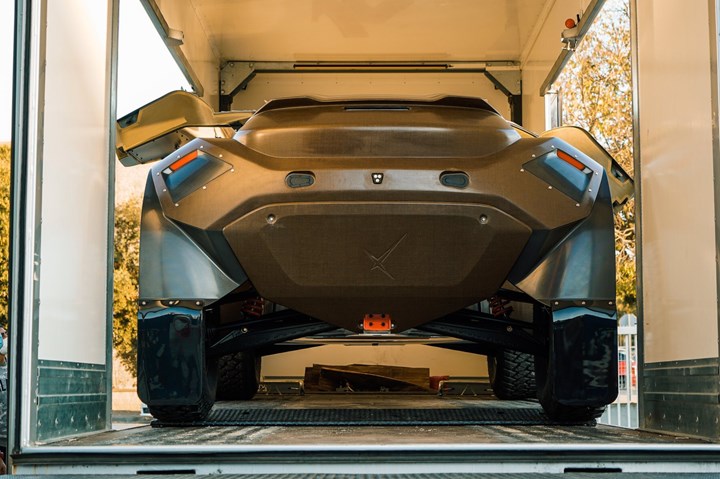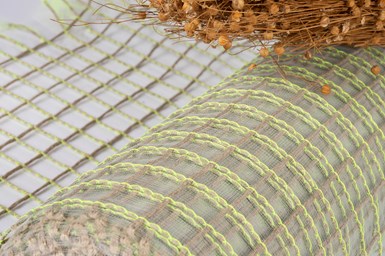All-electric SUV motorsport vehicle incorporates Bcomp natural fiber bodywork
In preparation for the Extreme E racing series, Spark vehicles use ampliTex and powerRibs technologies for more sustainable, efficient and safe off-roading.

All photo credit: Bcomp
Sustainable lightweighting specialist Bcomp (Fribourg, Switzerland) reports that it supplied its ampliTex and powerRibs natural fiber composite technologies for the all nine Spark Odyssey all-electric SUVs competing in the inaugural season of the Extreme E Championship, which began in Saudi Arabia with its first event, the 2021 Grand Desert Prix, on April 3-4. The natural fiber bodyworks, designed by Spark Racing Technology, will continue to be put to the test across four more brutal race weekends spanning four continents.
The Extreme E Championship is an FIA-sanctioned international off-road racing series that seeks to highlight the impact of climate change while promoting sustainability and the adoption of electric vehicles (EVs). As such, Spark Racing Technology (Tigery, France) — the manufacturer of the race-spec Odyssey SUV — focused on bringing together frontier electric vehicle technologies and industry-leading sustainability experts.
“Bcomp’s natural fiber technologies are a perfect match for the goals we set for ourselves in Extreme E, achieving the highest level of sustainable performance and safety,” says Théophile Gouzin, technical director of Spark Racing Technology. “ We are happy about the successful collaboration with Bcomp as both companies are technology leaders in sustainable motorsports.”

Bcomp powerRibs reinforcement.
Bcomp says its proprietary powerRibs reinforcement grid uses the high specific bending stiffness of flax to boost natural fiber performance to the level of carbon fiber, while offering an 85% cradle-to-gate CO2 reduction (see Volta Trucks incorporates Bcomp’s natural fiber technologies in automotive application). In combination with ampliTex fabrics, Bcomp’s solutions enable sustainable bodyworks with the same stiffness and weight as carbon fiber, while improving safety and 250% better damping properties. Bcomp’s natural fiber bodyworks also help minimize the risk of injuries with its ductile breaking behavior, which, on impact, results in blunt-edged pieces rather than sharp debris like carbon fiber (see “Natural fiber crash box design for motorsport”).
While Bcomp’s technologies are already used in 16 racing series around the world, the company notes that its applications are not restricted to motorsport. From automotive interior panels for electric performance brand Polestar (Gothenburg, Sweden), to luxury yachting and the European Space Agency’s (ESA) latest natural-fiber satellite panels, Bcomp’s technologies are relied upon wherever weight, stiffness and sustainability are important.
“We are thrilled to be working with Spark to provide our sustainable lightweighting solutions for the Odyssey bodywork,” says Christian Fischer, CEO and co-founder at Bcomp. “Having our technology involved in this series is an incredible opportunity for Bcomp; racing in such a wide variety
of locations, climates and terrains will really test our materials and conclusively demonstrate their capability and performance. Sustainable composites offer a practical path forward for so many industries, motorsport included. Given the volume of production, consumption, waste and emissions
involved in the supply, use and disposal of carbon fiber, the implementation of sustainable composites is a clear step in the right direction.”
Related Content
-
Jeep all-composite roof receivers achieve steel performance at low mass
Ultrashort carbon fiber/PPA replaces steel on rooftop brackets to hold Jeep soft tops, hardtops.
-
Carbon fiber, bionic design achieve peak performance in race-ready production vehicle
Porsche worked with Action Composites to design and manufacture an innovative carbon fiber safety cage option to lightweight one of its series race vehicles, built in a one-shot compression molding process.
-
Automotive chassis components lighten up with composites
Composite and hybrid components reduce mass, increase functionality on electric and conventional passenger vehicles.














.jpg;maxWidth=300;quality=90)

